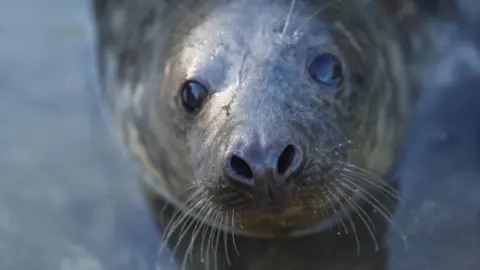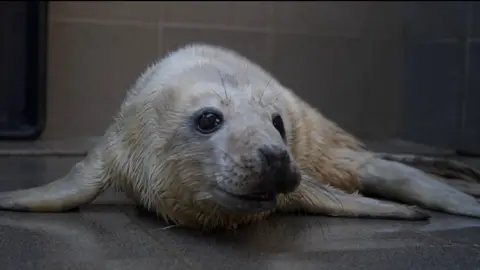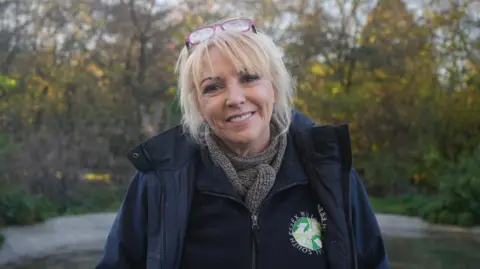Rising sea and storms 'almost disastrous' for seals
 Jamie Niblock/BBC
Jamie Niblock/BBCAn independent animal hospital has said winter storms and rising sea levels "can be almost disastrous" for grey seal pups.
South Essex Wildlife Hospital, based at Orsett, said it helped rescue 100 grey seal pups in the last 12 months, compared with about 20 seals five years ago.
Grey seals on the east coast usually have their pups in December and storms can leave mothers separated from their infants.
Tom Linsel, chief veterinarian at the hospital, said the team was on high alert this winter.
He said turbulent weather could be "almost disastrous" for the pups.
"Especially on the east coast where the storms can be really high - especially in the last few years where it looks like climate change is affecting the height of the water," said Mr Linsel.
"You only need one storm where the water gets really high, or really big waves, and you can wash off the whole population on a particular beach."
There is not enough scientific evidence to conclude that climate change is making storms more frequent in the UK, but it is making rain associated with storms more intense.
However, scientific evidence shows climate change is causing UK sea levels to rise.
The National Trust has said the loss of predictable weather patterns has caused "chaos" for nature.
 Jamie Niblock/BBC
Jamie Niblock/BBCThe UK is home to about 120,000 grey seals - roughly 40% of the world's population.
While common seals give birth in June and July, the pupping season for grey seals coincides with the start of the UK storm season.
Exactly when these pups first start to appear depends on where in the country they live.
Increasing callouts
For the first few weeks of their lives, the pups need to suckle from their mothers to gain weight.
Seal pups do not become waterproof until they moult and grow their grey coats.
The British Divers Marine Life Rescue (BDMLR) charity said it received 2,000 callouts for seals in 2020, but in recent years it was closer to 2,600.
 Jamie Niblock/BBC News
Jamie Niblock/BBC NewsOne seal had to be flown to Essex by private jet after being found exhausted and underweight in a harbour in Jersey in October - before it was treated at the hospital.
Rocky has since been released at Walton-on-the-Naze.
Hospital owner Sue Schwar said her team was "overwhelmed" by the number of seal pups that needed treating, and that on average, it cost £5,000 to rehabilitate each one.
She said the increasing number of pups being brought into the centre was partly down to "increased awareness" and reports from the public - but that the weather appeared to be playing its part.
Stormy weather could wash the pups out to sea or further up on to rocks, Ms Schwar explained.
"We are on high alert but unfortunately that doesn't give us more resources suddenly," she said.
"We can't crack open a box of inflatable seal pup pens to put them all in."
She said it could take up to six months before releasing a seal pup into the wild and that there was no way of reuniting them back with their mothers.
"We are flat out all-year round now - there's no chance of respite like there used to be in the winter months."
Mixed picture
Meanwhile, the RSPCA has actually reported a decrease in the total number of seals - of all species and ages - it was treating.
A spokesperson said 272 were admitted to its four wildlife centres in the UK this year, compared with 303 two years ago.
Its emergency hotline received 499 reports relating specifically to seals in 2024, compared with 647 in 2022.
Follow Essex news on BBC Sounds, Facebook, Instagram and X.
